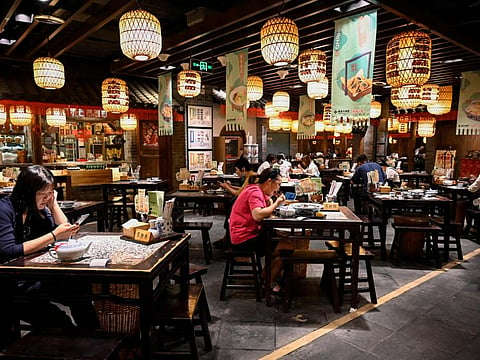Beijing reopens restaurants as new COVID-19 cases drop
Diners return to restaurants in most of Beijing for the first time in more than a month

Beijing: Diners returned to restaurants in most of Beijing for the first time in more than a month Monday as authorities further eased pandemic-related restrictions after largely eradicating a small COVID-19 outbreak in the capital under China’s strict “zero-COVID” approach.
Museums, cinemas and gyms were allowed to operate at up to 75% of capacity and delivery drivers could once again bring packages to a customer’s door, rather than leave them to be picked up at the entrances to apartment compounds.
The return to near-normal applied everywhere in Beijing except for one district and part of another, where the outbreak lingered. Schools, which partially reopened earlier, will fully do so on June 13, followed by kindergartens on June 20.
Authorities conducted multiple rounds of mass testing and locked down buildings and complexes when infections were discovered to stamp out an outbreak that infected about 1,800 people over six weeks in a city of 22 million. The number of new cases dropped to six on Sunday.
The ruling Communist Party remains wedded to a “zero-COVID” strategy that exacts an economic cost and inconveniences millions of people, even as many other countries adopt a more relaxed approach as vaccination rates rise and treatments become more widely available.
In Shanghai, a population of 25 million people endured a citywide lockdown that kept most confined to their apartments or neighborhoods for two months. The city reopened last week, but restaurants remain closed except for delivery and takeout. One neighborhood conducted more mass testing on Monday after finding new cases in a residential compound, which is now locked down for 14 days.
In both Beijing and Shanghai, anyone entering the subway or an office building, shopping mall or other public place must show a negative test result within the past 72 hours. People lined up at testing stations that have been set up around the cities to meet the requirement.
All ferries in Shanghai, which is bisected by the Huangpu river, resumed normal operation on Monday. But organisers postponed the Shanghai International Film Festival, which was scheduled to be held this month, until next year.
Elsewhere, the government responded to outbreaks in China’s Inner Mongolia region, where 39 new cases were recorded on Sunday and in the northeast city of Dandong, which has had about 130 cases in the past two weeks. Dandong is on the border with North Korea, which acknowledged an outbreak for the first time last month.



